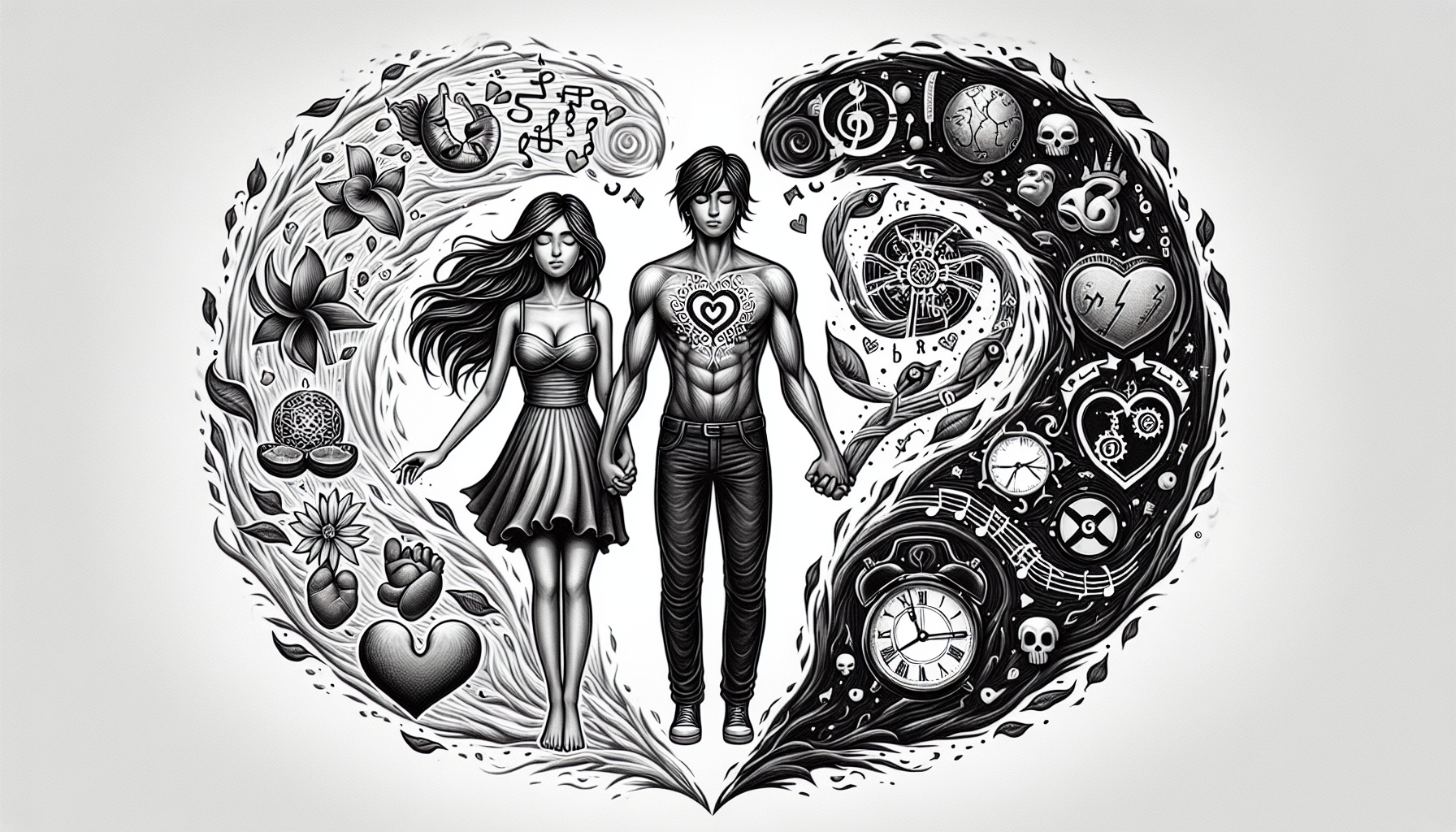
So you’re curious about the difference between a relationship and dating, aren’t you? Well, fret not, because we’ve got you covered! In this article, we’ll explore the nuances of these two terms and shed some light on what sets them apart. If you’ve ever wondered if you’re in a committed relationship or just casually dating someone, read on to discover the distinctions and gain a better understanding of where you stand. Whether you’re navigating the complexities of modern romance or simply indulging your curiosity, we’re here to help you decode the intricacies of relationships and dating. Let’s get started, shall we?
Defining a Relationship
Exclusive Commitment
In a relationship, exclusive commitment is a key characteristic that sets it apart from casual dating. When you are in a committed relationship, you and your partner have made a mutual decision to only be romantically involved with each other. This means that you both agree to be faithful and monogamous, focusing your romantic and physical efforts solely on each other.
Long-Term Orientation
Another defining aspect of a relationship is the long-term orientation. Unlike casual dating, which may involve short-term interactions and limited expectations, a relationship is built on the foundation of a lasting connection. You and your partner have a vision of a future together and are willing to invest time and effort into nurturing and growing your bond.
Emotional Connection
Emotional connection forms the heart of a relationship. It goes beyond surface-level interactions and casual flings. In a relationship, you and your partner develop a deep emotional bond characterized by trust, understanding, and support. This connection allows you to share your joys, fears, and vulnerabilities with each other, creating a sense of companionship and emotional security.
Characteristics of Dating
Casual Interactions
Dating involves casual interactions and getting to know someone on a more personal level. It is a period of exploration where you meet potential partners and engage in activities together, such as going on dates, attending events, or simply spending time getting to know each other. These interactions are typically less serious and committed compared to those in a relationship.
Exploratory Phase
During the dating phase, you and your potential partner are in an exploratory phase. You are still learning about each other’s interests, values, and goals. It is a time of discovering shared connections and determining compatibility. This phase allows you to gauge whether or not there is potential for a deeper and more committed relationship.
Multiple Partners
Unlike in a relationship, where exclusivity is expected, dating allows for the possibility of seeing multiple partners simultaneously. You are not yet committed to one person and have the freedom to explore different options. This aspect of dating distinguishes it from a relationship where you have chosen one person to exclusively focus on and invest your emotions in.

Distinguishing Factors Between Relationship and Dating
Level of Commitment
The level of commitment is a key factor that distinguishes a relationship from dating. In a relationship, both partners have made a conscious decision to commit to each other exclusively. This commitment is not present in dating, where individuals are free to see and date multiple people without the expectation of exclusivity or long-term commitment.
Purpose and Intent
The purpose and intent behind a relationship and dating also differ. In a relationship, the purpose is to build a strong, long-lasting connection with a partner based on love, trust, and mutual support. Dating, on the other hand, may serve various purposes, such as getting to know different people, exploring compatibility, or simply enjoying the companionship without the expectation of a long-term commitment.
Future Orientation
Relationships are characterized by a future-oriented mindset, with partners envisioning a life together. They make plans, set goals, and work towards building a shared future. However, dating is often more focused on the present and enjoying the journey of getting to know someone without necessarily envisioning a long-term commitment or future plans together.
Key Elements of a Relationship
Mutual Trust and Respect
In a healthy relationship, mutual trust and respect form the foundation. Trust allows you and your partner to rely on each other and feel secure in the relationship. Respect involves valuing each other’s opinions, boundaries, and individuality. Cultivating these elements ensures a healthy and satisfying relationship based on mutual understanding and support.
Shared Values and Goals
Having shared values and goals is essential for a successful relationship. When you and your partner share similar values and aspirations, it creates a sense of alignment and compatibility. This alignment helps in making important decisions together, resolving conflicts, and building a life that is meaningful to both of you.
Communication and Understanding
Effective communication is a crucial element of a relationship. It involves open and honest dialogue where you can express your thoughts, feelings, and concerns, and actively listen to your partner. Good communication fosters understanding, empathy, and connection, creating a healthy and harmonious relationship.

Aspects of Dating
Getting to Know Someone
Dating provides an opportunity to get to know someone on a deeper level. Through conversations, shared activities, and spending time together, you can learn more about their personality, interests, and values. It allows you to develop a sense of familiarity and connection before deciding whether to pursue a more committed relationship.
Testing Compatibility
One aspect of dating involves testing compatibility. During this phase, you and your potential partner explore how well your values, interests, and lifestyles align. It helps you assess whether there is enough compatibility and common ground to establish a strong foundation for a relationship.
Uncertain Future
Dating often includes an element of uncertainty about the future. Since dating does not necessarily involve a commitment or long-term orientation, it can leave room for uncertainty or ambiguity, especially if both individuals have different expectations or are not yet ready to commit. This uncertainty can sometimes make it challenging to navigate the dating phase effectively.
Importance of Communication
Open and Honest Dialogue
Communication plays a vital role in both relationships and dating. To maintain a healthy and fulfilling connection, it is essential to have open and honest dialogue with your partner. Expressing your thoughts, emotions, and needs in a clear and respectful manner promotes understanding and fosters a deeper connection.
Regular Check-ins
Regular check-ins are crucial for the well-being of any relationship. Taking the time to communicate with your partner, discussing how you both feel about the relationship, and addressing any concerns or issues that may arise helps to maintain a strong and healthy connection. Regular check-ins ensure that both partners are on the same page and can address any potential misunderstandings or conflicts in a timely manner.
Resolution of Differences
Effective communication also facilitates the resolution of differences in relationships. Disagreements and conflicts are inevitable in any relationship, but how you handle them can make all the difference. By actively listening to each other’s perspectives, finding common ground, and working towards a solution together, you can strengthen your bond and overcome challenges.
Benefits of Being in a Relationship
Emotional Support
Being in a committed relationship provides a reliable source of emotional support. Your partner becomes a trusted confidant, offering comfort, reassurance, and understanding during difficult times. Having someone who is genuinely there for you and supports you emotionally significantly enhances your overall well-being and resilience.
Intimacy and Physical Connection
Intimacy and physical connection are crucial elements of a relationship. Sharing physical affection, closeness, and intimacy with your partner fosters a deep sense of connection and bonding. It allows you to express love, desire, and vulnerability in a safe and trusting environment.
Building a Life Together
Being in a relationship offers the opportunity to build a life together with your partner. You can create shared experiences, make joint decisions, and work towards common goals. Building a life together involves creating a sense of stability, security, and mutual investment in each other’s happiness and success.
Advantages and Disadvantages of Dating
Creating Memories
One advantage of dating is the opportunity to create lasting memories. Exploring new experiences, going on adventures, and sharing moments with different individuals can be exciting and enriching. It allows you to broaden your horizons and discover what you truly value in a partner or relationship.
Variety and Fun
Dating offers a variety of experiences and interactions with different people. It provides a chance to meet individuals from diverse backgrounds, interests, and perspectives. This variety can be refreshing and bring excitement to your life, especially if you enjoy meeting new people and experiencing different ways of being.
Lack of Stability
One disadvantage of dating is the potential lack of stability. Since dating often involves seeing multiple partners simultaneously or exploring different options, it can be challenging to establish a consistent and stable connection. This lack of stability can sometimes lead to uncertainty, emotional ups and downs, and difficulty in finding a long-lasting and committed relationship.
Steps to Transition from Dating to a Relationship
Mutual Agreement
The first step in transitioning from dating to a relationship is a mutual agreement. Both you and your partner need to be on the same page and communicate your desire to move towards a committed relationship. This agreement ensures that both parties are willing and ready to take the next steps together.
Define the Relationship
Defining the relationship is essential to establish clarity and boundaries. Discussing expectations, exclusivity, and the level of commitment you both desire creates a solid foundation for the transition. It allows you both to understand each other’s needs and intentions, ensuring a smooth transition into a relationship.
Intensify Emotional Connection
As you transition from dating to a relationship, focusing on intensifying the emotional connection is crucial. Invest time and effort into deepening your bond, expressing vulnerability, and building trust. Increasing your emotional connection helps solidify the relationship and lays the groundwork for a strong and lasting partnership.
Navigating the Challenges
Maintaining Independence and Individuality
Maintaining independence and individuality is important in any relationship. It is essential to continue nurturing your own interests, hobbies, and friendships, even when in a committed relationship. Balancing your individuality with the demands and expectations of a relationship helps to foster a healthy sense of self and prevents the relationship from becoming suffocating or codependent.
Resolving Conflicts
Conflicts are inevitable in any relationship, but how you handle them is crucial. Effective communication, active listening, and finding mutually agreeable solutions are essential for resolving conflicts. It is important to approach conflicts with empathy, understanding, and a willingness to compromise, ensuring that both partners feel heard and valued.
Adapting to Change
Relationships, like life, are constantly evolving and changing. It is necessary to adapt to these changes and embrace them as opportunities for growth. Flexibility, open-mindedness, and a willingness to navigate new challenges together are key to successfully navigating the ups and downs of a relationship.
In conclusion, relationships and dating have distinct characteristics and purposes. While a relationship involves exclusive commitment, a long-term orientation, and a deep emotional connection, dating is characterized by casual interactions, an exploratory phase, and the possibility of multiple partners. The key elements of a successful relationship include mutual trust and respect, shared values and goals, and effective communication. Dating allows for getting to know someone, testing compatibility, and experiencing a more uncertain future. Communication plays a vital role in both relationships and dating, fostering understanding, resolution of differences, and regular check-ins. Being in a relationship provides emotional support, intimacy, and the opportunity to build a life together, while dating allows for creating memories, variety, and fun. Transitioning from dating to a relationship requires mutual agreement, defining the relationship, and intensifying the emotional connection. Navigating the challenges of a relationship involves maintaining independence, resolving conflicts, and adapting to change. By understanding these distinctions and implementing healthy practices, you can cultivate a fulfilling and lasting relationship or make the most of your dating experiences.




